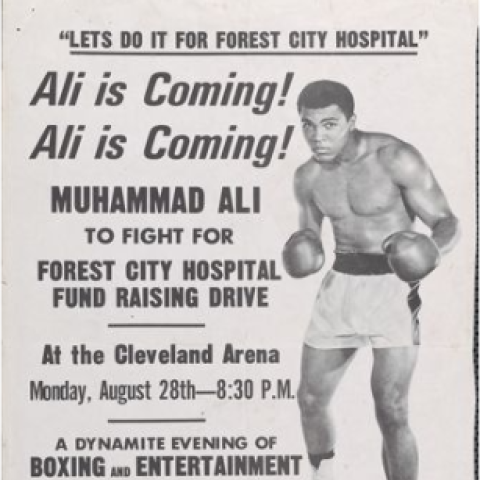The legacy of Forest City Hospital—an institution founded in 1957 by Black physicians to serve Cleveland’s Glenville neighborhood—is now accessible online thanks to a team of experts at Case Western Reserve University’s Kelvin Smith Library (KSL). With the support of an Ohio Local History Alliance grant, the team spent almost a year digitizing the collection housed at the university’s Dittrick Medical History Center, providing access to primary sources relating to the hospital’s significance for research and scholarly pursuits outside of Northeast Ohio.
Forest City Hospital came about after decades of advocacy, fundraising and planning by community leaders and physicians who saw a need to create opportunities for Black clinicians. KSL’s preservation services team used state-of-the-art equipment and techniques to convert the hospital’s photographs, historical records and audio-visual materials to digital files.
“We use a phase 100 megapixel reprographic rig to photograph the documents, it can do bound materials, flat materials and transmissive materials like film negatives,” said Andrew Mancuso, team lead for preservation services at Kelvin Smith Library. “We have another lab that has audio-visual capabilities. So when we get a tape, we capture whatever audio is on it and clean it up a little to make sure users can hear it, and then it gets transcribed and made accessible through our repository.”
The process is slow-going. In all, the Forest City Hospital collection netted about 11,000 digital files!
“There’s a lot there if you go back and look,” said Crissandra George, digital collections librarian, of the two files generated for each item. “It was about one terabyte for the access copies, and 7.5 terabytes for the digitally preserved files (also known as preservation master files).”
Organizing the files proved to be a bit of a challenge, as the physical documents were sorted to make sense fiscally, but that didn’t translate well into the digital world.
“The metadata librarian, Lisa Longenecker, and I both worked a lot trying to make it as user-friendly as possible for a digital library and for users who might not know the collection before navigating it,” said George.
A rapidly changing healthcare landscape closed the hospital in 1978, but not before garnering attention from vocal advocates, like Muhammed Ali. Mancuso said a fundraising flyer featuring the famous boxer was one of the most memorable items from the collection.
To explore the history of Forest City Hospital you can visit KSL’s webpage for a link to Digital Case, or experience the items in-person, at the Dittrick Medical History Center located in Case Western Reserve’s Allen Memorial Medical Library.


